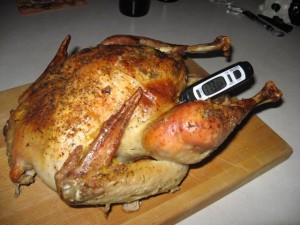How can a supposed science-based organization be taken seriously when it won’t incorporate science-based recommendations into its taxpayer-payer funded advice?
 Maybe the Brits think they above such pedantic notions.
Maybe the Brits think they above such pedantic notions.
According to the UK Food Standards Authority, chicken is safe as long as consumers follow good kitchen practice including, ake sure chicken is steaming hot all the way through before serving. Cut in to the thickest part of the meat and check that it is steaming hot with no pink meat and that the juices run clear.
BS.
FSA has just published results from its year-long survey of campylobacter on fresh chickens. Campylobacter is a food bug mainly found on raw poultry and is the biggest cause of food poisoning in the UK.
Cumulative results for samples taken between February 2014 and February 2015[1] have now been published as official statistics, including results presented by major retailer. The report can been found via the link further down this page.
The results for the full year show:
- 19% of chickens tested positive for campylobacter within the highest band of contamination*
- 73% of chickens tested positive for the presence of campylobacter
- 1% (five samples) of packaging tested positive at the highest band of contamination
- 7% of packaging tested positive for the presence of campylobacter
*More than 1,000 colony forming units per gram (>1,000 cfu/g). These units indicate the degree of contamination on each sample.
More than 4,000 samples of fresh whole chilled chickens and packaging have been tested. The chickens were bought from large UK retail outlets and smaller independent stores and butchers. The data shows variations between the retailers, but none has met the target for reducing campylobacter (see table below). A full analysis of the survey results, including the publication of the raw data and the full year results for smaller supermarkets and shops, is being carried out by the FSA and will be published later in the summer.
Further details of the ongoing testing of chickens for campylobacter were also confirmed by the FSA. A new survey will start this summer and once again sample fresh whole chickens from all types of shops. Continued testing will help the FSA to measure the impact of the interventions now being introduced by the industry to tackle campylobacter.
The FSA has welcomed the publication today of case studies by Marks & Spencer, Morrisons, the Co-op and Waitrose showing the results of their recently implemented campylobacter reduction plans. The data show significant decreases in the incidence of campylobacter on their raw whole chickens. The tests were carried out on more recent samples than those taken from the FSA survey samples, with some targeted to demonstrate the effect of particular interventions.
